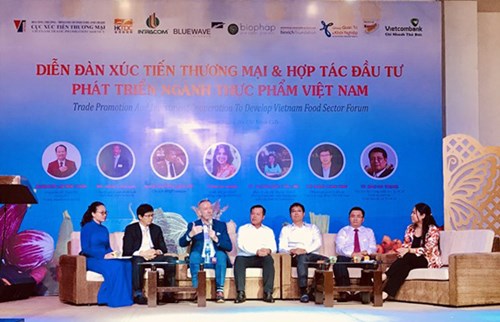Stephen Liang, assistant executive director of the Hong Kong Trade Development Council (HKTDC), said at the Forum for Trade and Investment Promotion for the Vietnam’s Food Sector that Hong Kong and the 10 ASEAN member states formally signed a free trade agreement and related investment agreement last November.
    |
 |
|
Speakers at the “Forum for Trade and Investment Promotion for the Việt Nam’s Food Sector” held in HCM City. Photo: VNS |
“These agreements marked a major milestone for Hong Kong-ASEAN collaboration on trade and economic matters, of which Vietnam has been a close trading partner in ASEAN for Hong Kong,” he said.
Vietnam is one of the most dynamic emerging countries in East Asia, with a rising middle class willing to eat non-local food, he said.
“I believe the high-quality food products our delegates offer will attract them. Professional service provision is another major area that stands a very good chance for further collaboration.”
Many companies in Vietnam want to reach out to overseas markets, including the fast-growing Chinese mainland.
“As an international business hub, Hong Kong service providers can offer a wide range of services, from logistics and supply chain management to marketing and packaging to assist Vietnamese companies,” he said.
Vu Ba Phu, head of the Trade Promotion Agency under the Ministry of Industry and Trade, said in recent years Vietnam’s food industry had been developing rapidly, supplying a number of highly competitive products for exports and the local market.
“The country’s annual food consumption value is estimated at 15 percent of the country’s GDP.”
Statistics show that over the past five years, consumption of processed foods has increased by 9.68 percent per year, and consumption of beverages by 6.66 percent per year.
According to estimates by BMI Research, Vietnam’s food industry will reach annual growth rate of 10.9 percent during the 2015-20 period, which will promote business opportunities and trade and investment for Vietnamese food companies.
Exports of farm produce in the first six months were estimated at USD 13.5 billion, up 9.5 percent from the same period of 2017.
Of the figures, exports of fruits and vegetables increased by 20.9 percent with total value of USD 2.01 billion.
Exports of seafood and aquaculture increased by 11 percent with total value of USD 3.96 billion in the period.
Vietnamese farm produce has been exported to 100 countries and territories.
“Vietnam has been a member of the WTO since 2007 and has signed 10 free trade agreements (FTAs) with other countries, opening up opportunities for businesses to invest in Vietnam, especially in the food processing industry,” Phu said.
Vietnam, which is one of the largest exporters of rice, coffee and cashew nuts, also has great potential for export of processed food, according to Phu.
The Ministry of Industry and Trade (MoIT) will continue to work with the Ministry of Planning and Investment and the Ministry of Agriculture and Rural Development and other agencies to offer the most favorable conditions for investors in the processed food industry.
The Trade Promotion Agency will continue to cooperate with agencies to hold more trade promotion activities for enterprises in the food industry.
Speakers also discussed other issues in the food industry such as raw materials, new trends in processed food products and new technologies to increase added value.
At the event, 50 exhibitors from 50 Vietnamese cities and provinces, including HCM City, An Giang, Soc Trang, Nghe An, Bac Giang, Can Tho and Kien Giang, displayed their farm produce.
The forum was organised by the MoIT’s Trade Promotion Agency, drawing more than 300 representatives from Vietnamese firms as well as 30 companies from Hong Kong (China), Japan, mainland China and the Republic of Korea.
Source: VNA